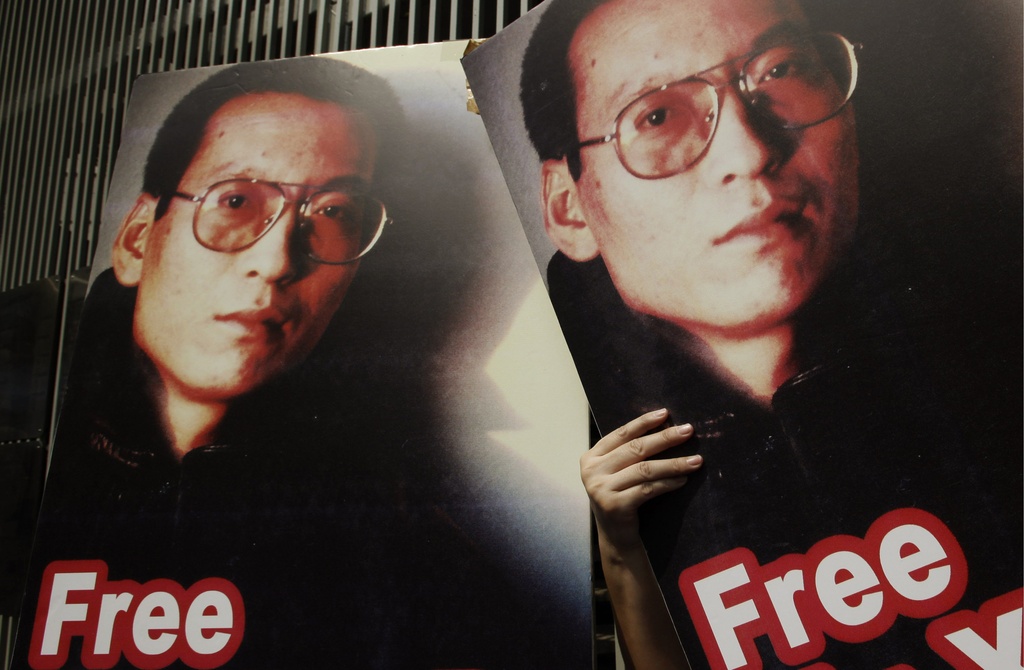
Chinese dissident gets Nobel Peace Prize

The 2010 Nobel Peace Prize has been awarded to Chinese human rights activist and dissident Liu Xiaobo.
The Nobel committee chose Liu, who is currently in prison, “for his long and non-violent struggle for fundamental human rights in China”.
The prize puts China’s human rights in the spotlight at a time when Beijing is seeking to play a bigger role on the global stage.
Liu, who was sentenced in China last Christmas Day to 11 years in jail, had received by far the most attention in the annual guessing-game for the $1.5 million (SFr1.45 million) award.
Liu was arrested and charged with “inciting subversion of state power” for co-authoring the so-called Charter 08.
This declaration calls for political reform, greater human rights, and an end to one-party rule in China, signed by hundreds of individuals throughout the country.
The former literature professor has consistently maintained that his prison sentence violates both China’s own constitution and fundamental human rights.
The Nobel committee said that China, now the world’s second-largest economy, must broaden the scope for political participation, pointing out that the country was “in breach of several international agreements to which it is a signatory, as well as of its own provisions concerning political rights”.
Liu rose to prominence as one of the leaders of a hunger strike during student protests on Tiananmen Square in 1989. He was later jailed for 20 months and then spent three years in a “labour re-education” camp during the 1990s, as well as months under virtual house arrest.
Award welcomed
The Swiss section of the human rights organisation Amnesty International welcomed the choice, calling Liu a “worthy winner”.
“We hope the prize will support the commitment of human rights activists in China who are working daily on behalf of fundamental rights and the protection of human rights,” wrote the organisation’s spokesman Daniel Graf, on its website.
“The Nobel peace prize will put more pressure on the Chinese government to release Liu Xiaobo and other prisoners of conscience.”
In a statement, quoted on the Swiss News Agency, the Swiss foreign ministry said that it had regularly been active on Liu’s behalf since his incarceration and called him a “defender of human rights”.
Chinese warning
Chinese Prime Minister Wen Jiabao did not take questions from journalists at a news conference in Turkey after the award was announced.
Chinese Deputy Foreign Minister Fu Ying had warned the head of the Nobel Institute against granting the prize to Liu during a visit to Oslo this summer, saying it would hurt ties between China and Norway.
A Chinese foreign ministry spokeswoman said last month that Liu’s actions were “diametrically opposed to the aims of the Nobel prize”.
“The person you just mentioned was sentenced to jail by Chinese judicial authorities for violating Chinese law,” said spokeswoman Jiang Yu.
It is the first Nobel for the Chinese dissident community since it resurfaced after the country’s communist leadership launched economic, but not political reforms three decades ago.
The win could jolt a current debate among the leadership and the elite over whether China should begin democratic reforms and if so how quickly.
China also strongly criticised Norway after the 1989 prize went to Tibet’s exiled spiritual leader, the Dalai Lama.
The last dissident to win the peace prize was Iranian lawyer and human rights campaigner Shirin Ebadi, in 2003.
Other names in this year’s Nobel buzz included Afghan women’s rights activist Sima Samar and Russian human rights activist Svetlana Gannushkina. The last woman to win the coveted award was Wangari Maathai of Kenya in 2004.
Former German Chancellor Helmut Kohl had also been tipped as a potential winner, for his role in the reunification of Germany 20 years ago.
The secretive peace prize committee, which is comprised of five former Norwegian politicians and Lundestad, received a record 237 nominations for this year’s prize.
The Nobel Prizes were established by Swedish industrialist Alfred Nobel and were first handed out in 1901. The peace prize is the only one given out in Norway – the rest are in Sweden.
2009 – US President Barack Obama for efforts to strengthen international diplomacy and cooperation between peoples.
2008 – Former Finnish President Martti Ahtisaari for peace work from Namibia to Kosovo.
2007 – Former US Vice-president Al Gore and the Intergovernmental Panel on Climate Change.
2006 – Muhammad Yunus and Bangladesh’s Grameen Bank for work to end poverty.
2005 – The International Atomic Energy Agency and its head Mohamed ElBaradei.
2004 – Kenyan environmentalist Wangari Maathai.
2003 – Iranian human rights lawyer Shirin Ebadi.
2002 – Former US President Jimmy Carter.
2001 – The United Nations and Secretary-general Kofi Annan.
2000 – South Korean President Kim Dae-jung.
Three Swiss have been awarded the Nobel Peace Prize:
1901: Henri Dunant, originator of the Geneva Conventions and founder of the International Committee of the Red Cross.
1902: Albert Gobat and Elie Ducommun of the Bern-based Permanent International Peace Bureau. This organisation also received the prize in 1910.
The ICRC has been awarded the prize three times (1917, 1944 and 1963).
Other Geneva-based organisations that have been recognised: League Of Red Cross Societies (1963), Nansen International Office For Refugees (1938), the UNHCR (1954, 1981), the International Labor Organization (1969), Mécecins Sans Frontières (1999) and the Intergovernmental Panel on Climate Change (2007).

In compliance with the JTI standards
More: SWI swissinfo.ch certified by the Journalism Trust Initiative




























You can find an overview of ongoing debates with our journalists here . Please join us!
If you want to start a conversation about a topic raised in this article or want to report factual errors, email us at english@swissinfo.ch.